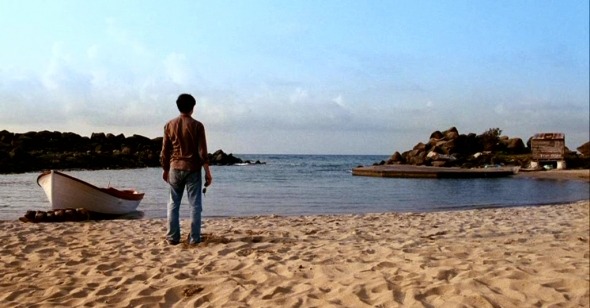Scattered People
by Elbert Ventura
The Edge of Heaven
Dir. Fatih Akin, Germany/Turkey, Strand Releasing
A German filmmaker of Turkish descent, Fatih Akin has made hybrid cultures and hyphenated identities his great subject. Head-On, his acclaimed breakthrough film from 2004, told a love story between two German Turks that wended its way back to the homeland. In The Edge of Heaven, his latest, the fixation on blurred borders and social dislocation continues on a larger canvas. Several characters shuttle back and forth between Turkey and Germany, even as the quest for home and rest seems increasingly quixotic. But let the overstuffed The Edge of Heaven be a lesson: Just multiplying and magnifying your obsessions does not make them any more powerful.
Divided into three chapters, the movie is populated by the homesick and the homeless. There’s Nejat (Baki Davrak), a professor of German literature in Hamburg, who returns to Turkey after his father commits an accidental crime. Going in the other direction is Ayten (Nurgül Yesilçay), a radical activist who escapes arrest in Istanbul by fleeing to Germany. Once there, Ayten bums around and searches for her mother, Yeter (Nursel Köse), who moved to Germany many years earlier. She turns out to be a prostitute, who one day services Ali (Tuncel Kurtiz), Nejat’s father, and takes him up on his offer to be his fulltime companion. Ayten meets and moves in with Lotte (Patrycia Ziolkowska), a college student at the same university where Nejat teaches. Ayten and Lotte fall in love, a development observed warily by her mother, Susanne (Hanna Schygulla), who will end up in Turkey by the sheer force of Akin’s authorial will.
That bustling synopsis is as problematic onscreen as it reads on the page. In an interview with the Montreal Mirror, Akin talked of a fecund period after the success of Head-On: “I put together all my notes and ideas, and pulled together various stories I’d heard. I asked, how can I put all those elements together?” It’s a comment that belies a writer unable or unwilling to edit himself. Instead of refining his material, Akin deems each theme and idea indispensable, with contrivance and cliché serving as the connective tissue that (barely) holds it all together. Characters cross paths without knowing it; the pull of fate—or, in this case, an overactive plot—is palpable. Akin’s resort to melodrama has drawn comparisons to Fassbinder, but The Edge of Heaven really comes off more like a poor man’s Kieslowski—a daft daisy chain of missed connections and strained affinities.
The winner of the Best Screenplay prize at last year’s Cannes Film Festival, the movie is certainly au courant in its preoccupations. Evoking the globetrotting alienation of Inarritu, Akin lays out his themes with great purpose and little subtlety. A description of the protagonist just about sums it up: a German professor of Turkish descent who goes back to Turkey and buys a German-language bookstore in Istanbul. (Lest we miss the metaphor, one of his cousins kindly points it out.) It’s a familiar vision of a globalized world Akin presents here, one in which brooding is the default mien, state institutions cast an implacable shadow, and English remains the global village’s Esperanto. The result of all this actual and metaphorical border-crossing isn’t so much a moving dispatch of how we live today than it is a dutiful checklist of postcolonial motifs and personal hang-ups.
But if the movie’s reach exceeds its grasp, it doesn’t necessarily render it without merit. For all of his weaknesses as a writer, Akin can be a vivid director. Head-On may have romanticized gutter life, but its soulful, sensual depiction of l’amour fou was never less than magnetic. The Edge of Heaven broods more and crackles less, but it keeps you hooked with its conviction. Part of its pull lies in Akin’s touching faith in the kindness of strangers. At every turn in the movie, a helping hand is offered to someone in need, a humane undercurrent that cuts through the narrative’s obstinate convolutions. The Edge of Heaven also establishes a few poignant tropes that are distinctly Akin’s: the solemn passenger staring out the window of a bus, the solitary tourist in a crepuscular hotel room, the voyage that leads to nowhere.
Perhaps “nowhere” is too strong. By movie’s end, Akin gives Nejat a place to rest, though the pall of ambiguity still pervades. An inversion of The 400 Blows’ freeze-frame by the sea, the movie’s last shot also happens to be its most poetic, an open-ended seaside image promising a family reunion in which Akin allows his overheated movie —and his peripatetic protagonist—to cool down and breathe.
